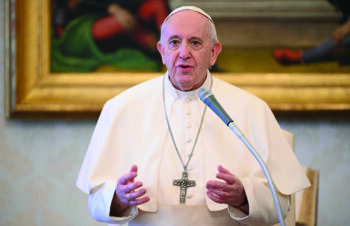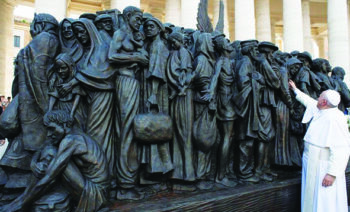A reflection on the prayer of Jacob
 An edited version of the Pope’s catechesis
An edited version of the Pope’s catechesis
One day Jacob hears the call of home. He sets out, undertaking a long journey until he reaches the final step, the Jabbok stream. Here the Book of Genesis (32: 23-33) describes that the patriarch Jacob, after having all of his people and all the livestock cross the stream, remains alone on the bank of the river on the foreign side. And he ponders: what awaits him the following day? Jacob’s mind is a whirlwind of thoughts. And, as it is getting dark, suddenly a stranger grabs him and begins to wrestle with him. The Catechism explains: “the spiritual tradition of the Church has retained the symbol of prayer as a battle of faith and as the triumph of perseverance” (CCC, 2573).
Change of name, life and attitude
Jacob wrestles the entire night, never letting go of his adversary. In the end he is beaten, his sciatic nerve is struck by his opponent, and he will walk with a limp for the rest of his life. That mysterious wrestler asks the patriarch for his name and tells him, “Your name shall no more be called Jacob, but Israel, for you have striven with God and with men, and have prevailed” (Genesis 32:28).
He changes his name, he changes his life, he changes his attitude. You will be called Israel. Then Jacob also asks the other: “Tell me, I pray, your name”. The other does not reveal it to him, but blesses him instead. Then Jacob understands he has encountered God “face to face” (vv. 29-30).
Limping into the promised land
Wrestling with God: a metaphor for prayer. Through a lengthy struggle that nearly makes him give up, the patriarch emerges changed. A change of name, a change in his way of life and a personality change: he comes out of it a changed man. He limps into the promised land: vulnerable and wounded, but with a new heart.
Meeting God in the night
We all have an appointment during the night with God, in the night of our life, in the many nights of our life -- dark moments, moments of sin, moments of disorientation. And there we have an appointment with God, always. He will surprise us at the moment we least expect, when we find ourselves truly alone. That same night, struggling against the unknown, we will realise that we are only poor men and women.
Right then, in that moment in which we feel we are ‘poor things’, we need not fear, because God will give us a new name, which contains the meaning of our entire life. He will change our heart and he will offer us the blessing reserved to those who have allowed themselves to be changed by him. This is a beautiful invitation to let ourselves be changed by God. He knows how to do it, because he knows each one of us. “Lord, You know me”, every one of us might say. “Lord, You know me. Change me”.
Source: General Audience, vatican.va,
10 June 2020
World Refugee Day and the pandemic
Yesterday the United Nations celebrated World Refugee Day. The coronavirus crisis has highlighted the need to ensure the necessary protection for refugees too, in order to guarantee their dignity and safety. I invite you to join me in praying for a renewed and effective commitment, on the part of us all, to the effective protection of every human being, especially those who have been forced to flee as a result of situations of grave danger to them or their families.
Another aspect on which the pandemic has made us reflect is our relationship with the environment. The lockdown has reduced pollution and revealed once more the beauty of so many places free from traffic and noise. Now, with the resumption of activities, we should all be more responsible for looking after the common home. I appreciate the many ‘grass roots’ initiatives that are emerging in this regard all over the world. For example, in Rome today there is an initiative dedicated to the river Tiber. But there are many others in other places! May they foster a citizenship that is increasingly aware of this essential common good.
Source: vatican.va, Angelus Address, 21 June 2020

 Entries(RSS)
Entries(RSS)